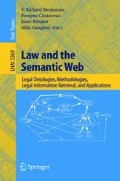Abstract
This article shows how the first generalized developments of legal informatics in the Civil Law systems were coherent with the dominant conception of the Law during the 70s and 80s. Today, that conception of the Law is in crisis, and it is possible to talk about a change in the mentality of jurists as well. Both changes generate new spaces and further opportunities for legal informatics and for legal knowledge management.
Access this chapter
Tax calculation will be finalised at checkout
Purchases are for personal use only
Preview
Unable to display preview. Download preview PDF.
References
Aguiló-Regla, J.: Lenguaje jurídico, lenguaje documental y thesaurus, Teoría 5(12-13), pp. 31–65 (1990)
Aguiló-Regla, J.: Técnica legislativa y documentación automática de legislación. Informatica e Diritto, 87–110 (1990)
Benjamins, R., Fensel, D., Decker, S., Gómez-Pérez, A.: Building Ontologies for Internet: a Mid-term Report. International Journal of Human-Computer Studies 51, 687–712 (1999)
Dworkin, R.: TakingRights Seriously. Harvard University Press, Mass. (2002)
Dworkin, R.: A Matter of Principle. Harvard University Press, Mass. (1985)
Dworkin, R.: Law’s Empire. Belknap Press of Harvard University Press, Mass. (1986)
Habermas, J.: Faktizität und Geltung. Beiträge zur Diskurstheorie des Rechts und des demokratischen Rechtsstaats, Suhrkamp (1994)
Alexy, R.: Theorie der Juristischen Argumentation, Suhrkamp (1978)
Alexy, R.: Theorie der Grundrechte, Suhrkamp (1994)
Raz, J.: Practical Reason and Norms. Princeton University Press, New York (1990)
Nino, C.S.: La validez del Derecho. Astrea, Buenos Aires (1985)
Nino, C.S.: Fundamentos de Derecho Constitucional. Astrea, Buenos Aires (1992)
Nino, C.S.: The Constitution of Deliberative Democracy. Yale University Press, Yale (1996)
Ferrajoli, L.: Diritto e ragione: Teoria del garantismo penale, Laterza (1989)
Ferrajoli, L.: Los fundamentos de los derechos fundamentales, Trotta, Madrid (2001)
Author information
Authors and Affiliations
Editor information
Editors and Affiliations
Rights and permissions
Copyright information
© 2005 Springer-Verlag Berlin Heidelberg
About this chapter
Cite this chapter
Aguiló-Regla, J. (2005). Introduction: Legal Informatics and the Conceptions of the Law. In: Benjamins, V.R., Casanovas, P., Breuker, J., Gangemi, A. (eds) Law and the Semantic Web. Lecture Notes in Computer Science(), vol 3369. Springer, Berlin, Heidelberg. https://doi.org/10.1007/978-3-540-32253-5_2
Download citation
DOI: https://doi.org/10.1007/978-3-540-32253-5_2
Publisher Name: Springer, Berlin, Heidelberg
Print ISBN: 978-3-540-25063-0
Online ISBN: 978-3-540-32253-5
eBook Packages: Computer ScienceComputer Science (R0)

